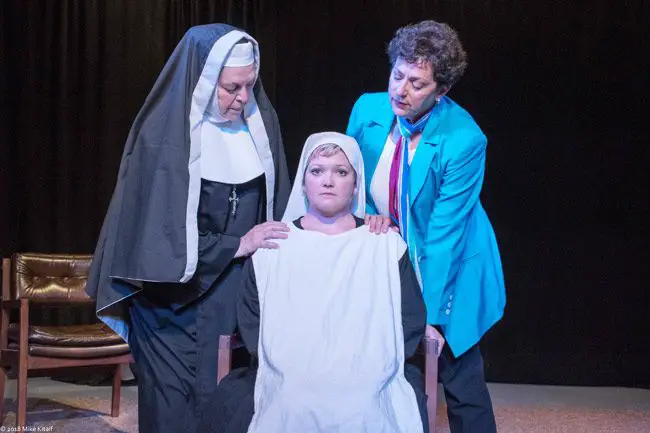
Easily book tickets here.
“Agnes of God,” City Repertory Theatre’s latest production, is a murder mystery, a whodunit about a newborn found dead at a convent.
Only, says City Rep stage manager Jerry Lapidus, “in a Hitchcockian way, the baby, the murder, is the maguffin – it’s the gimmick that lets us tell the story.”
John Pielmeier’s 1979 drama tells the story of a young nun, Sister Agnes (played by Chelsea Jo Conard), who is suspected of murdering her newborn baby — a birth she insists resulted from a miraculous virgin conception. Martha Livingston, a court-appointed psychiatrist and lapsed Catholic (Julia Davidson Truilo), is sent to assess the sanity of the young nun. But the psychiatrist clashes with the convent’s protective Mother Superior (Nancy Howell).
“This play has nothing to do with anti-Catholicism,” says director and City rep co-founder John Sbordone.
And, it turns out, not so much with “whodunit.”
“The murder mystery is used to explore what we believe and why we believe,” Sbordone says. “I always talk about ‘Agnes’ as the little sister of ‘Equus,’” Peter Shaffer’s 1973 play about a psychiatrist treating a young man whose religious fascination with horses has turned violent. “For me, ‘Equus’ is the most marvelous expression that I’ve run into of what primitive religion is. What those passions that drive us toward a deity are all about.”
Similarly, Sbordone adds, “Agnes of God” is “an investigation of religion, of faith, of what we believe, how we believe, why we believe.”
And of science.
Along with relationships with God and other big metaphysical questions, the play also delves into real-world relationships between people.
“Each character has something inside that they’re holding onto that’s making them uncomfortable,” says Diane Ellertsen, City Rep co-founder and “Agnes of God” assistant director. “One has issues with her mother. One was being abused. One’s kids don’t talk to her. So they’re trying to keep all these things in order, and if they don’t have to deal with them, then they don’t exist. But all this is bubbling to the surface.”
“Agnes has had a really tough, abusive upbringing,” says Conard, who – like Truilo and Howell – is a City Rep veteran. “To the outside eye, she looks very troubled and a little crazy at times.”
“She’s an abused child with an imaginary friend – who just happens to be Mary,” Truilo interjects.
“Agnes has turned to faith partly from her upbringing, so she would have something to grasp onto, but also because she was put into the convent,” Conard says. “From the beginning of her life, the abuse was all she knew. Now coming to this place of peace, that’s all she knows. She’s confused in a lot of ways, but there’s an innocence about her because she’s never really experienced anything else.”
The Mother Superior, Howell says, “is the mother superior in every way possible — a take-charge kind of woman. She’s trying to explain how this could possibly have happened with all kinds of answers that are reasonable, logical, scientific — sort of.”
And the Mother Superior has to deflect suspicion not only from Agnes but from herself, Howell says.
The psychiatrist “is worldly, thoughtful, very fact-driven,” Truilo says. “But she contains a lot of personal anguish that these two characters recall to her. She sees her own struggles against her mother and Catholicism. So she casts her issues, like a good psychiatrist would”–she laughs–“onto these strawmen, and in doing so she wreaks havoc.”
Will Pielmeier’s play, which was turned into a 1985 film starring Jane Fonda, Anne Bancroft and Meg Tilly, make audience members examine or re-examine why they believe what they believe, spiritually or otherwise?
“Absolutely,” Sbordone says. “Now, does it last longer than your second martini? I don’t know. If theater does not have the power to transform in that way, then we probably shouldn’t be doing it.”
The Mother Superior’s most important line in the play, Howell says, “is when talk turns to miracles and she is asked ‘Do you believe that?’ And the Mother Superior says, ‘I want to believe it. I want the opportunity to believe it. I want the choice to believe it.’ ”
It’s also Pielmeier’s have-your-cake-and-eat-it-too nod to believers even as belief is questioned, but within bounds that never get too subversive: more Reinhold Niebuhr than Voltaire. You never doubt that Pielmeier is a believer or that he wants you to be one too, which weakens the tension at the heart of the play: his hand would have been better left unseen. Thankfully, there’s Sbordone’s corrective hand which, in local theater, is always mightier even than god’s.
“It’s not an anti-Catholic play in any way, shape or form — it’s an intellectual discussion,” Truilo says. “It’s about the value of faith: What place does faith, not religion but faith, have in our lives? Is our life less rich without it? What do we substitute when we lose it? The play sets out the questions but it doesn’t set out the answers.”
–Rick de Yampert for FlaglerLive
![]()
“Agnes of God,” written by John Pielmeier, directed by John Sbordone, starring Nancy Howell, Julia Davidson Truilo and Chelsea Jo Conard, at City Repertory Theatre, 7:30 p.m. May 4-5 and 11-12, and 2 p.m. May 6 and 13. Performances at CRT’s venue in City Market Place at 160 Cypress Point Parkway, Suite B207, Palm Coast. Tickets are $20 adults and $15 students. For more information or tickets, call the CRT box office at 386-585-9415 or easily book online here.





























Leave a Reply